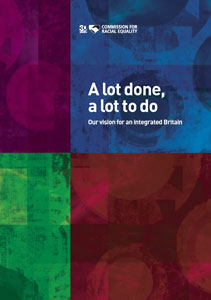See also
Links categories
- Business and finance
- Community and society
- Criminal justice
- Legal advice and the law
- Education
- Employment
- Diversity and integration
- Health and social care
- Europe and international
- Local government services
- Media
- Immigration and asylum
- Politics and government
- Research
Downloads
Download time approx. 4m 33s at 28 Kbps Download time approx. 2m 47s at 56 Kbps Download time approx. 1m 47s at 128 Kbps Download time approx. 0m 11s at 512 Kbps
Download time approx. 1m 11s at 28 Kbps Download time approx. 1m 36s at 56 Kbps Download time approx. 0m 16s at 128 Kbps Download time approx. 0m 4s at 512 Kbps
Download time approx. 1m 3s at 28 Kbps Download time approx. 1m 31s at 56 Kbps Download time approx. 0m 14s at 128 Kbps Download time approx. 0m 3s at 512 Kbps
Did you find this page useful?
Page information
This page was last updated on 20 September 2007

A lot done, a lot to do
Our vision for an integrated Britain
The CRE's final legacy document outlines the current state of UK race today with facts and statistics relating to all aspects of British life, from young people, health and education through to employment, communities, sport and local government.
In it, the CRE sets out the challenges faced in creating an integrated society and some key steps that need to be taken to reduce pernicious inequalities, growing social segregation and declining participation.
Below, you can read the introduction, or you can download the complete report (pdf, 723kb). There is also a Welsh language version available.
The CRE's monitoring and enforcement report, 2005-7 (pdf, 213kb), which has been much discussed in the media, is also available.
Only a few decades ago, it was acceptable to put up a sign in a boarding house or B&B saying 'No blacks, no Irish, no dogs'. We don't see those signs anymore, thanks to the race relations legislation that made them illegal, as well as thirty years of hard work by the Commission for Racial Equality and others in changing the national mindset to make them morally inconceivable.
But let's not kid ourselves. Britain, despite its status as the fifth largest economy in the world, is still a place of inequality, exclusion and isolation. Segregation - residentially, socially and in the workplace - is growing. Extremism, both political and religious, is on the rise as people become disillusioned and disconnected from each other. Issues of identity have a new prominence in our social landscape and have a profound impact upon race relations in Britain.
An ethnic minority British baby born today is sadly still more likely to go on to receive poor quality education, be paid less, live in substandard housing, be in poor health and be discriminated against in other ways than his or her white contemporaries. This persistent, longstanding inequality is quite simply unfair and unacceptable.
On top of this, our society is fracturing. The pace of change in Britain over the last few years has unsettled many, and caused people to retreat into and reinforce narrower ethnic and religious ties. Bonds of solidarity across different groups have reduced and tensions between people have increased. Such tensions often arise from the fear of difference, and Britain's diversity, which should be a source of strength, risks becoming one of division. We live in a society where people may live side by side, occupy the same spaces and schools and shop in the same high streets, but too often they lead parallel lives that never meet. Rumours and perceptions of injustice in such circumstances can trigger division and conflict. In some cases, this translates as violence on the street, against individuals and particular groups. More often, it appears in the clustering of different groups or in invisible barriers being erected to keep others out.
At the Commission for Racial Equality, we have long believed that the best way to approach the challenges we face as a country is through an agenda based upon a developed notion of integration.
To achieve an integrated Britain, we need to achieve equality for all sections of society, interaction between all sections of society and participation by all sections of society.
Over the past thirty years, the CRE has promoted and often led great changes that have undoubtedly improved many aspects of British society, whether to improve individual life chances, promote better relations between different groups or to raise standards in public life. But, of course, we face new and ever greater challenges, and there is still much to do. As we welcome a new prime minister and a new national institution, the Commission for Equality and Human Rights, it is right to take stock. Combining the knowledge gained from CRE-commissioned research, our local and regional contacts and our experience in the field with the expertise and skills of our staff and partners, we seek to clarify the challenges that others must take forward once the CRE closes its doors at the end of September 2007.
In our final strategic plan, we set out our priorities for change:
- developing and enforcing existing and new powerful legal tools to promote racial, and religious, equality;
- reducing racism and extremism;
- tackling racial inequalities in education, health, criminal justice, housing and employment; and
- promoting interaction between people of all ages and backgrounds and increased participation in local community work by people from all ethnic groups.
In this document, we set out how to put these plans into action in specific fields of life, looking first at the situation today, the existing challenges and the work the CRE has done to date, before setting some ambitious goals for those entrusted with the job of promoting racial equality in the future.
This work is profoundly important in creating a country with true equality of opportunity: a country that can embrace its diversity as a strength and harness the skills of all its people. This will lead not only to increased economic productivity and international competitiveness, but also to fairness and social justice.
The CRE might be leaving the stage, but our work must go on. To ignore the challenges contained within this document is to condemn future generations to perpetual inequality and exclusion.
